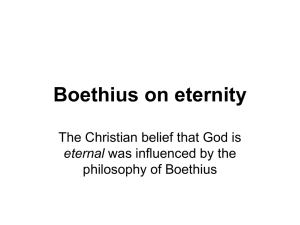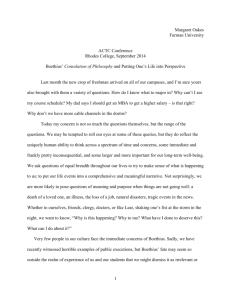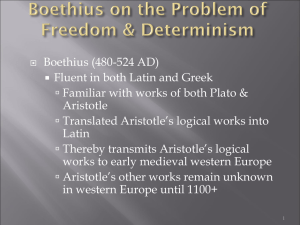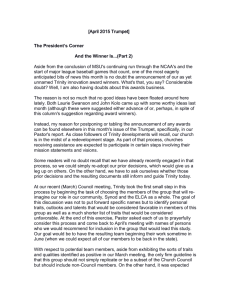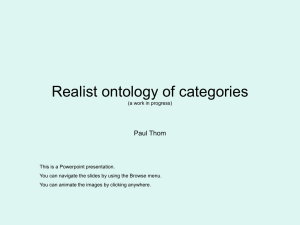Boethius on Relation in De Trinitate
advertisement
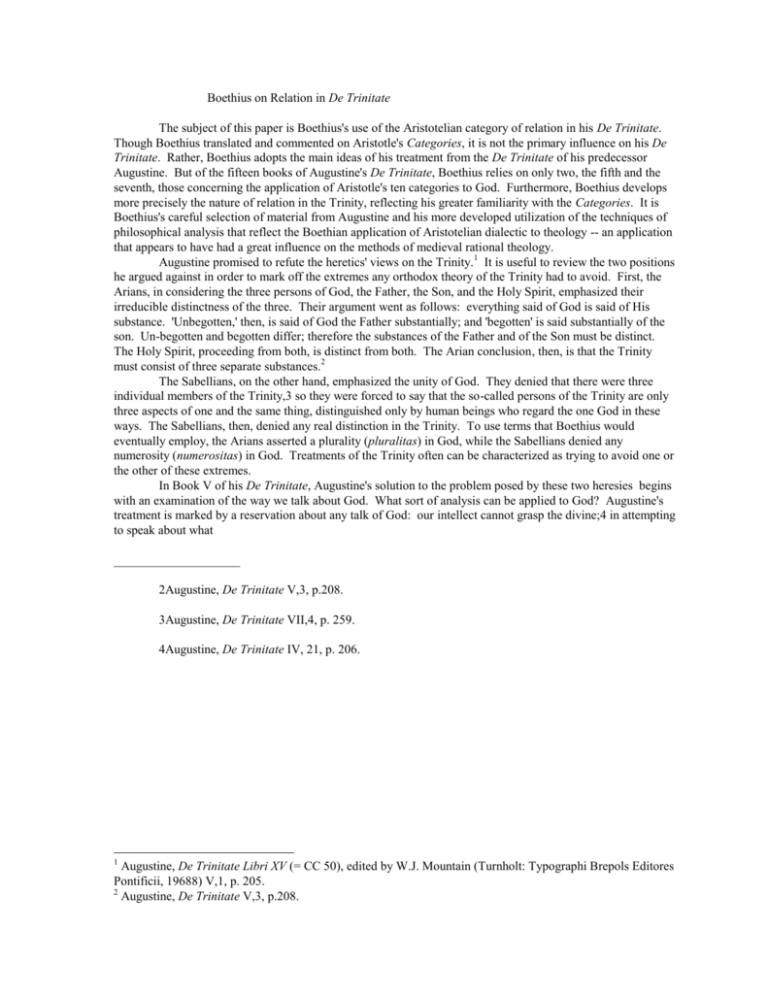
Boethius on Relation in De Trinitate The subject of this paper is Boethius's use of the Aristotelian category of relation in his De Trinitate. Though Boethius translated and commented on Aristotle's Categories, it is not the primary influence on his De Trinitate. Rather, Boethius adopts the main ideas of his treatment from the De Trinitate of his predecessor Augustine. But of the fifteen books of Augustine's De Trinitate, Boethius relies on only two, the fifth and the seventh, those concerning the application of Aristotle's ten categories to God. Furthermore, Boethius develops more precisely the nature of relation in the Trinity, reflecting his greater familiarity with the Categories. It is Boethius's careful selection of material from Augustine and his more developed utilization of the techniques of philosophical analysis that reflect the Boethian application of Aristotelian dialectic to theology -- an application that appears to have had a great influence on the methods of medieval rational theology. Augustine promised to refute the heretics' views on the Trinity.1 It is useful to review the two positions he argued against in order to mark off the extremes any orthodox theory of the Trinity had to avoid. First, the Arians, in considering the three persons of God, the Father, the Son, and the Holy Spirit, emphasized their irreducible distinctness of the three. Their argument went as follows: everything said of God is said of His substance. 'Unbegotten,' then, is said of God the Father substantially; and 'begotten' is said substantially of the son. Un-begotten and begotten differ; therefore the substances of the Father and of the Son must be distinct. The Holy Spirit, proceeding from both, is distinct from both. The Arian conclusion, then, is that the Trinity must consist of three separate substances.2 The Sabellians, on the other hand, emphasized the unity of God. They denied that there were three individual members of the Trinity,3 so they were forced to say that the so-called persons of the Trinity are only three aspects of one and the same thing, distinguished only by human beings who regard the one God in these ways. The Sabellians, then, denied any real distinction in the Trinity. To use terms that Boethius would eventually employ, the Arians asserted a plurality (pluralitas) in God, while the Sabellians denied any numerosity (numerositas) in God. Treatments of the Trinity often can be characterized as trying to avoid one or the other of these extremes. In Book V of his De Trinitate, Augustine's solution to the problem posed by these two heresies begins with an examination of the way we talk about God. What sort of analysis can be applied to God? Augustine's treatment is marked by a reservation about any talk of God: our intellect cannot grasp the divine;4 in attempting to speak about what ____________________ 2Augustine, De Trinitate V,3, p.208. 3Augustine, De Trinitate VII,4, p. 259. 4Augustine, De Trinitate IV, 21, p. 206. 1 Augustine, De Trinitate Libri XV (= CC 50), edited by W.J. Mountain (Turnholt: Typographi Brepols Editores Pontificii, 19688) V,1, p. 205. 2 Augustine, De Trinitate V,3, p.208. Andrews-3we cannot fully understand, we try to apply words to the ineffable, "so that we might be able to speak in some way about that which we cannot fully express in any way."5 Theologians before Augustine had recognized two ways we might try to speak about God, the positive way and the negative way,6 which some medievals called cataphatic (the positive attribution of characteristics to God, although with a recognition of the extent to which such attributes are metaphorically applied), and apophatic (talking about God by saying what he is not -- He is not mortal, not finite, not temporal, etc.)7 Augustine introduces the categories into his discussion of the Trinity, in Book V with a list of negative predications, ways in which attributes of God do not fall under the categories that might seem to cover them: He is (1) good without quality, (2) great without quantity, (3) a creator of things without any need of created things (relation), (4) present without position, (5) containing all things without possession, (6) ubiquitous wholly without location, (7) everlasting without time, (8) making changeable things without any change (action) in ____________________ 5Augustine, De Trinitate VII, 4; translated by Stephen McKenna in Saint Augustine: The Trinity (Washington: Catholic University of America Press, 1963), p. 229: "...ut fari aliquo modo possemus, quod effari nullo modo possumus..." 6Harry Austryn Wolfson, "Negative Attributes in the Church Fathers and the Gnostic Basilides," in Studies in the History of Philosophy and Religion (Cambridge, Mass.: Harvard University Press, 1973), pp. 131-42. 7Found, for example, in John Scotus Eriugena; cited by John Marenbon, From the Circle of Alcuin to the School of Auxerre (Cambridge: Cambridge University Press, 1981), p. 72. Andrews-4himself, and (9) undergoing nothing.8 These observations govern the nine final categories, called 'accidents', although in an order slightly different from Aristotle's. The first category, substance, is left out of the list, for Augustine unreservedly applies substance to God.9 Augustine apparently excludes any of the accidents from being applied to God because an accident, by definition,10 is capable of change. Since God is absolutely immutable in every respect, his attributes cannot be accidents.11 Augustine, however, is willing to explore further the way the categories may be ascribed to God, as for example in Holy Scripture. To this end he introduces another list describing the positive application of the categories to God, although here the list is subdivided into two kinds of terms, those said of God's substance, and those said of God only metaphorically. Besides being one substance, God is called 'great' by ____________________ 8Augustine, De Trinitate V,1, p. 207: "...sine qualitate bonum, sine quantitate magnum, sine indigentia creatorum, sine situ praesentem, sine habitu omnia continentem, 'sine loco ubique totum,' sine tempore sempiternum, sine ulla sui mutatione mutabilia facientem nihilque patientem." 9Augustine, De Trinitate V,2, p. 207: "Est tamen sine dubitatione substantia vel si melius hoc appellatur essentia, quam graeci ousian vocant." 10As codified by Porphyry in the Isagoge: "What comes into being and passes away apart from the destruction of the substratum is an accident." Edward Warren, trans. (Toronto: Pontifical Institute of Medieval Studies, 1975), p. 48. 11Augustine, De Trinitate V,4, p. 209: "Nihil itaque accidens in deo quia nihil mutabile aut amissibile." Andrews-5the Psalmist, and'good' in the Gospels.12 So at least the first three categories are said properly of God, without implying plurality, for when they are said of God they are identical to His one substance. However, other categorical terms are used only metaphorically; as for example when God is said to sit "above the cherubim" (Ps. 103), the category of situation is used only as a metaphor. It is in this way that the categories of disposition, place, and time are also used.13 While the category of undergoing is not applied to God at all, not even metaphorically, Augustine makes an exception amomg the final categories to say that perhaps action is said of God most truly.14 This category can also be understood to be identical to God's single substance. Augustine's list of positive attribution of categories to God is designed to avoid threatening any Sabellian plurality in God; each category applies only to God's substance, or else metaphorically. There is one category left out of Augustine's account so far, for it forms the basis of his solution to the problem of the Trinity. Among created things, there is an exhaustive dichotomy between substance and accident; if something is spoken of not substantially, it is spoken of according to accident. But, according to Augustine, for God, although nothing is said according to accident, not everything is said ____________________ 12Augustine, De Trinitate V, 8, p. 215. 13Augustine, De Trinitate V, 8, pp. 216-7. 14Augustine, De Trinitate V, 8, p. 216: "Quod autem ad faciendum attinet fortassis de solo deo verissime dicatur..." Andrews-6substantially, because some things are said relatively (ad aliquid).15 God is spoken of relatively when the members of the Trinity are described in relation to one another.16 Here, then, is Augustine's chief applica-tion of what seems to be a category within the Trinity. Following the Greek Fathers, Augustine says that the Father begets the Son, and that the Son is begotten by the Father. The Holy Spirit is said to proceed from both. 'Begets', 'begotten', and 'proceeds' are ordinarily relative terms. But applied to the Trinity, they do not admit the possibility of change that this category usually entails. The Father always (timelessly) is the Father, and the Son always (timelessly) is begotten by the Father,17 and there never can any change between them. So Augustine holds that relation in the divine is not an accident because it cannot undergo change. But does Augustine thereby imply that relation does not share other features of accident, in particular, the traditional requirement that accidents must be in a substance as a subject?18 If relation is in God's substance, but is not the same as God's substance, God's simplicity is destroyed. Augustine refers to one ____________________ 15Augustine, De Trinitate V,5, p. 210. 16Augustine, De Trinitate V,11, p. 218: "Quod autem proprie singula in eadem trinitate dicuntur nullo modo ad se ipsa sed ad invicem aut ad creaturam dicuntur, et ideo relative non substantialiter ea dici manifestum est." 17Augustine, De Trinitate V,5, p. 210: "...semper natus est illius nec coepit umquam esse filius." 18Cf., for example, Boethius In Categorias Aristotelis, PL 171A: "Omne enim accidens in subjecto est, et quidquid in subjecto est, illud est accidens." Andrews-7characteristic of accident, that it is susceptible to change, to argue that relation in God is not an accident; but this does not avoid another problematic feature of accident, that of inhering in substance. August-ines's solution does not consider this characteristic, which challenges his attempt to deny plurality in God. But Augustine does not consider himself to be giving a complete philosophical solution to the problem of the Trinity, although he does use terms derived from dialectic. Augustine presents his solution as though he were most concerned with the requirements of the human mind, how it might be satisfied in the face of the mystery of the Trinity, and not with a thorough dissection in philosophical terms. He uses the philosophical terms he does not by way of giving a full account of the Trinity, but only in order to enable us to say something acceptable about it.19 Words are, of course, inadequate for the ineffable.20 Ultimately, if the explanations offered cannot be grasped by reason, the revealed truth about the Trinity -- that God is three persons in one substance -- should be held fast by faith.21 Boethius attempts to push explanation farther than Augustine does, although he, too, acknowledges faith based on authority as the ultimate ____________________ 19Augustine, De Trinitate V,9, p. 217: "Tamen cum quaeritur quid tres, magna prorsus inopia humanum laboret eloquim. Dictum est tamen 'tres personae' non ut illud diceretur sed ne taceretur." Cf. VII,6, p. 262. 20Augustine, De Trinitate VII,4, p. 255. 21Augustine, De Trinitate VII,6, p. 267. Andrews-8recourse of the philosopher-theologian. The mark of Boethius's faith is in the introduction to De Trinitate, where he promises to press his inquiry "only so far as the insight of man's reason is allowed to climb the height of heavenly knowledge,"22 and at the conclusion, where he offers up his achievement to the judgement of Symmachus, his father-in-law: he hopes to have "furnished some fitting support in argument to an article which stands quite firmly by itself on the foundation of Faith..."23 Boethius's position seems fundamentally Augustinian, though perhaps with a stronger attempt to harmonize faith and reason. Boethius, like Augustine, discusses the categories as they may be positively applied to God. But Boethius diverges from Augustine at the outset by claiming that not even the category of substance applies to God. Rather, God is beyond substance.24 By this unreserved declaration that God falls under none of the categories, Boethius makes an advance over Augustine, and indeed over his earlier25 position in the second Theological Tractate, where he held that substance is predicated of God ____________________ 22Boethius, De Trinitate, in The Theological Tractates and The Consolation of Philosophy, translated by H.F. Stewart, E.K. Rand, and S.J. Tester (Cambridge: Harvard University Press, 1978), p. 5. 23Boethius, De Trinitate VI, p. 31. 24Boethius, De Trinitate IV, pp. 16-18: "Nam cum dicimus 'deus,' substantiam quidem significare videmur, sed eum quae sit ultra substantiam..." 25John Mair, "The Text of the Opuscula Sacra," in Boethius: His Life, Thought, and Influence, Margaret Gibson, ed. (Oxford: Basil Blackwell, 1981), p. 210; following V. Schurr, Die Trinitätslehre des Boethius im Lichte der 'skythischen Kontroversen' (Paderborn, 1935), pp. 97-104. Andrews-9and relation of the Trinity.26 Boethius's decisive acknowledgement that none of the categories apply adequately to God allows him, when categorical terms are used about God, to specify in just which respects they apply, and to reject any traditional aspects of the categories of substance or relation that might threaten heresy if applied to God. In order to develop his solution to the problem of the Trinity, Boethius gives a special sense to the word 'predication' (praedicatio) which allows him to say that in some sense certain categories are predicated of God. Boethian predication occurs when P is predicated of S as if P were S itself, the very thing of which P is predicated. Boethius's formula is "it is so said as if it were the thing itself of which it is predicated."27 In this formula, which he repeats for substance, quantity, and quality, Boethius says how these categories may be predicated. Whatever is predicated according to Boethius indicates something about an entire essence, id quod est,28 simply and completely. A surprising consequence of this stringent requirement for predication is that a man is not a substance at all.29 Man, after all, is not simply and entirely himself, for a man owes his existence to things apart from ____________________ 26Boethius, Utrum Pater et Filius,in The Theological Tractates and The Consolation of Philosophy, translated by H.F. Stewart, E.K. Rand, and S.J. Tester (Cambridge: Harvard University Press, 1978), p. 36. 27Boethius, De Trinitate IV, p. 18.36-7: "..ita dicitur quasi ipse hoc sit de quo pradicatur..." 28Boethius, De Trinitate II, p. 10.41-2. 29Boethius, De Trinitate IV, p. 18.32-3: "...quoniam homo non integre ipsum homo est ac per hoc nec substantia; quod enim est, aliis debet quae non sunt homo." Andrews-10himself, such as the sun and earth required for his generation. In the same way, to be a man and to be a man with the quality of justness are different things.30 But God, who is just and is great, is His justness and His greatness.31 The first three categories of substance, quality, and quantity are all predicated of God in the same way; that is, they say what God is simply and entirely, although it must be remembered that God is ultimately beyond even substance. This is a puzzling claim. John Marenbon says that Boethius is making two apparently contradictory claims: that "God is, strictly speaking, beyond substance"; and that "it is of God alone that substance may be properly predicated."32 I think that Boethius is trying to reconcile the usual talk of God with his reservation that terms applied to God do not retain their ordinary senses. The final seven categories are not predicated, in the Boethian sense, of either God or man. Instead, Boethius says, they are attached extrinsically (extrinsecus..affigant).33 It is worth detailing the way Boethius distinguishes the two kinds of categories in a brief passage at the end of the fourth chapter: the first kind of category points to a ____________________ 30Boethius, De Trinitate IV, pp. 18.40. 31Boethius, De Trinitate IV, p. 18: "Neque enim aliud est quod est, aliud est quod iustus est, sed idem est esse deo quod iusto." Cf. Augustine, De Trinitate V,8, p. 216. 32John Marenbon, From the Circle of Alcuin to the School of Auxerre (Cambridge: Cambridge University Press, 1981), p. 28. 33Boethius, De Trinitate IV, p. 24.103-4. Andrews-11thing, the second kind to the circumstances of a thing.34 The former are predicated as though to show something to be a thing, but the latter in a way attach something extrinsically.35 The first may be called "praedicationes secundum rem," the others "accidentia secundum rem," indicating that Boethius wishes to restrict true predication to the former. Finally, when anything is predicated of God, since he is not subjected to anything, the predication is called "secundum substantiam rei praedicatio."36 Boethius wants two things from the application of the categories to God: to affirm the numerosity of the Trinity, while denying any plurality in God. In the first four chapters of De Trinitate Boethius has largely followed Augustine in denying that there is any plurality in God. But in Chapter V, Boethius discusses the category of relation, for Boethius intends the application of this category to God to account for the numerosity of the Trinity. Boethius makes some effort to define number, and to distinguish the senses in which number applies to things. Elaboration of some points about number seem apposite to theological questions about the Trinity, which posits a God somehow one and somehow three. Boethius begins with some elementary points about diversity and sameness; the source of ____________________ 34Boethius, De Trinitate IV, p. 24.100-1: "Quod aliae quidem quasi rem monstrant aliae vero quasi circumstantias rei..." 35Boethius, De Trinitate IV, p. 24.101-4: "...quodque illa quae ita praedicantur, ut esse aliquid rem ostendant, illa vero ut non esse, sed potius extrinsecus aliquid quodam modo affigant." 36Boethius, De Trinitate IV, p. 24.105-8. Andrews-12diversity is also the source of sameness (idem); both arise, Boethius says, from genus, species or number,37 a three-fold distinction apparently drawn fron Aristotle's Topics.38 Difference in number is caused by difference of accidents. In certain cases plurality is not produced by number, as when there is a repetition of the number by which we enumerate.39 Plurality is produced only when there is a repetition of that by which we number.40 Boethius's example of a repetition without difference is "ensis, mucro, gladius," an example familiar from his Categories commentary.41 Such a repetition is an iteration of units rather than a numeration, as though I were to say "sun, sun, sun": here ____________________ 37Boethius, De Trinitate I, p. 6. 38Aristotle, Topics I, 7; cited by Eleonore Stump, "Hamartia in Christian Belief: Boethius on the Trinity," in Donald Stump, et. al., ed., Hamartia: The Concept of Error in the Western Tradition. (Toronto and New York: Edwin Mellen, 1983), p. 132. 39Boethius, De Trinitate III, p. 14.14: "...qui in rebus numerabilibus constat." 40Boethius, De Trinitate III, p. 14.13-4: "...quo numeramus." Henry Chadwick finds the same distinction in Proclus's commentary on the Parmenides; in Boethius: The Consolations of Music, Logic, Theology, and Philosophy (Oxford: The Clarendon Press, 1981), p. 216. 41The editors of De Trinitate locate the same illustration in the Comment. in Arist. Peri hermeneias, 2nd ed. (Meiser), 56.12; it appears also in In Categorias (PL 64, 164A), and in the fragment attributed to Boethius by Hadot (Arch. d’hist. doc. et litt. du moyen age 34 (1959),p. 12), as well as in the pseudo-Augustinian Categoriae decem (Arist. latinus I,5, p. 136). Chadwick (Boethius, p. 216) calls it a "school convention" and locates it in Simplicius (In Cat. 38,26) and Philoponus (PG 94, 753B). Andrews-13I am not suggesting that there are three suns, but have only mentioned the single sun three times.42 Boethius says there is a similarity between this case and that of the Trinity. In God, there is no diversity of genus or species. Nor should we be misled by a repetition of names to think that there is a plurality of substance in God: if 'God' is named three times (God the Father, God the Son, God the Holy Spirit), the threefold predication does not indicate a plurality. But Boethius draws a distinction between ensis and mucro, as multivocal terms, which are both idem and ipse (translated as "the same" and "identical"), and Father, Son, and Holy Spirit, which although idem, "the same," are not ipse, "identical". Boethius does not want to fall into the error of the Arians, who find plurality in the Trinity.43 But Boethius says that some difference of number does enter in; this difference of number is caused by relation. Boethius aligns relation more closely with the second group of categories distinguished earlier, those that are not predicated. A relative is not predicated of things secundum se,44 nor is it predicated as though it were the thing itself.45 When you take away one of a pair of relatives, the remaining one ceases to be related, but this property ____________________ 42Boethius, De Trinitate III, p. 14.27-8: "...velut si dicam 'sol sol sol,' non tres soles effecerim, sed de uno totiens praedicaverim." 43Boethius, De Trinitate I, p. 6.12-5. 44Boethius, De Trinitate V, p. 24.5-7: "Age enim, quoniam dominus ac servus relativa sunt, videamus utrumne ita sit ut secundum se sit praedicatio an minime." 45Boethius, De Trinitate V, p. 26.36-7: "...quasi ipsa sit..." Andrews-14of relation is not like the inherence of whiteness in a white thing. Eleonore Stump has pointed out the relevant difference between the kinds of categories by saying that one can change a man from being a master not by doing anything to the man, but simply by removing his slave; "the quality whiteness, on the other hand, cannot be taken away from a white thing without changing that thing itself."46 As is true of the second group of categories generally, relation is not predicated of a thing simply and entirely. Nothing that is not predicated in that way can add to, alter, or disturb the essence of a thing.47 And so it is a unique feature of relation that, while it says nothing about the essence of a thing, and so any number of applications of relation does not imply a plurality of substances, still its application does require the existence of some other thing, that to which it is related. Relation consists in a certain comparison.48 At the beginning of Chapter VI, Boethius says,"No relation can be referred to itself."49 But there seems to be a problem in reconciling this last mentioned phrase and one that precedes it, where he says that the comparison implied by relation is not always ad aliud, but sometimes ____________________ 46Eleonore Stump, "Hamartia," p. 140. 47Boethius, De Trinitate V, p. 26.31-3. 48Boethius, De Trinitate V, p. 26.20: "...in comparatione..." - 49Boethius, De Trinitate VI, p. 28.1-2: "...nulla relatio ad se ipsum referri potest..." Andrews-15ad idem.50 How can relation, which cannot be referred to itself (ad se ipse), be referred to the same (ad idem)? This point is particularly important, for Boethius says that relation in the Trinity is like that of idem ad id quod est idem.51 These apparent conflicts can be cleared up by reference to a point Boethius makes in his commentary on the Categories. In commenting on 6a36-b5, Boethius discusses two kinds of relatives, where he says, Of those [relatives] which are converted according to case, there are some which are predicated by the same name, but others which [are predicated] by a dissimilar [name]: for when I say a similar [thing] is similar to a similar [thing], and an equal is equal to an equal, and a dissimilar [thing] is dissimilar to a dissimilar [thing], the whole predication is by the same words and by the same names. When, however, I call twice twice of a half, or greater greater than a lesser, the predica-tion is made by disparate words.52 The difference in relatives that Boethius is pointing up here is simply one of designations. Some relatives differ in names, such as master and servant, while others, such as equals, are the same in name. ____________________ 50Boethius, De Trinitate V, p. 26.21-2: "...nec semper ad aliud sed aliquotiens ad idem." 51Boethius, De Trinitate VI, p. 30.19-22: "...et similis est relatio in trinitate patris ad filium et utriusque ad spiritum sanctus ut eius quod est idem ad id quod est idem." 52Boethius, In Categorias Aristotelis, PL 64, 219B-C: "Eorum autem quae secundum casus convertuntur, alia sunt quae eodem nomine praedicantur, alia vero quae dispari: cum enim dico simile simili simile est, et aequale aequali aequale est, et dissimile dissimili dissimile est, eisdem vocabulis eisdemque nominibus tota fit praedicatio. Cum autem dico duplum medii duplum, vel majus minore majus, disparibus vocabulis facta est praedicatio." Andrews-16But this latter kind of designation in no way suggests that a thing can be related to itself in such a relationship; after all, brothers are also relatives that are the same in name, and no man is his own brother.53 According to Boethius's Categories commentary, something that is related must be related to something else.54 In the De Trinitate, this distinction among relatives is alluded to when the nature of relation in the Trinity is under discussion. One kind of relation is to something different (ad differens), as for example a master to a slave;55 but there are other relations such that aequale aequali aequale est, and simile simili simile est, and idem ei quod est idem idem est.56 Relation in the Trinity, Boethius says, is like this final example; relation within the Trinity is like that of idem ad id quod est idem.57 There is a difficulty with this passage as it is rendered by its English translators. They say that relation in the Trinity is like 'a relation of identicals'.58 But when they do so, they are inconsistent ____________________ 53Cf. Augustine's De Trinitate V, 7, p. 212, where the examples are 'amicus' and 'vicinus'. 54Boethius, In Categorias Aristotelis, PL 64, 217A-B: "Quocirca cum unius relativi nuncupatio mox secum etiam aliud trahat ad aliquid, unum esse per se non potest..." 55Boethius, De Trinitate VI, p. 30.16. 56Boethius, De Trinitate VI, p. 30.18-9. 57Boethius, De Trinitate VI, p. 30.21-2. 58Boethius, De Trinitate VI, p. 31; translated by H.F. Stewart, E.K. Rand, and S.J. Tester. Andrews-17with their translation of an earlier passage, where it was said that brand and blade are the same and identical, but that the Father, Son, and Holy Spirit are the same, idem, and not identical, ipse.59 It seems to me that the translation of the earlier passage should be retained, and that the relation of Father, Son, and Holy Spirit is like that of "the same to that which is the same as it." Let us consider more closely the import of this odd-sounding phrase. When Boethius claims that relation between persons of the Trinity is like a relation of the same to that which is the same as it, he is doing so in order to explain the numerosity of the Trinity without falling into the error of Arian plurality. He has chosen the relation of sameness in order to direct our attention to a relation in the world which expresses the least possible difference. Two things in the world may be the same in almost every respect, Boethius holds, but they will still have an inescapable otherness (alteritas) separating them. Of three men, Boethius says, who differ neither by genus nor species, ...if we mentally remove from them all other accidents, still the places for each are diverse, which we cannot by any means make into one place, since two bodies will not occupy one place, and place is an accident.60 But when we consider the persons of the Trinity we are considering a relation between incorporeals. There is no distinction of place among ____________________ 59Boethius, De Trinitate III, p. 16.47. 60Boethius, De Trinitate I, pp. 6.27-8.30. Andrews-18incorporeals, Boethius says,61 and no other distinctions because of accidents in God. Boethius has gone as far as he can to minimize the distinction between the persons of the Trinity to avoid any Arian separation of them, while appealing to the connection of one thing to another that is implied by relation. Is Boethius's analysis completely successful? It seems subject to a number of criticisms, some of which have been articulated by Eleonore Stump in her article "Hamartia in Christian Belief: Boethius on the Trinity".62 Taking issue with Boethius's claim that the persons of the Trinity differ only in relative attributes, Professor Stump argues that it is impossible that there be no difference between two relata which nonetheless are two non-identical things.63 That is, with no difference of substance, and with no distinguishing accidental attributes, how can any numerosity be said to survive at all? This objection accuses Boethius of falling into Sabellian error. But it has taken Boethius a long time to reach the point where he can make himself clear about his views, for there were many difficulties in the way. First of all, the very application of words to God had to be called into question. Boethius resolved this problem by introducing a strict technical sense of the word 'praedicatio', so that to predicate ____________________ 61Boethius, De Trinitate V, p. 28.48-9. 62In Hamartia: The Concept of Error in the Western Tradition, ed. Donald V. Stump et al. (Toronto and New York: Edwin Mellen, 1983), pp. 131-48. 63Eleonore Stump, "Hamartia," pp. 142-3. Andrews-19something strictly is to say something that applies solely and completely to the essence of the subject. But relation cannot be properly predicated; that is, it does not refer to the simple and entire substance of that to which it is applied. Thus, the ascription of different relations in the Trinity avoids the pluralizing of God's substance, as was threatened by the Arians. However, there is another feature of relation that obtains in both the world and in God; and that is the fact that relation requires the connection of one thing to what is in some respect distinguishable from it. Boethius appeals to this feature of relation to account for the numerosity of the Trinity, yet appeals to the least distinguishing kind of relation to avoid the plurality supposed by the Arians.64 He has taken relation in the Trinity and isolated it from the substance of God, by establishing that it is not predicated strictly, and so has no effect on God's single substance. Thus Boethius responds to the Arian conclusion that the Trinity entails the essential plurality of God. Then, he points out that relation in the Trinity is like the relation among creatures which indicates the least possible difference, while in God there is none of the accidental differences which account for the otherness (alteritas) among creatures. And yet a final feature of relation allows Boethius to claim he has successfully distinguished among the persons of the Trinity, and that is the fact that a relation necessitates a distinction of one thing from what is related to it, and ____________________ 64Boethius, De Trinitate VI, p. 28.3-7. Andrews-20- in this way is constituted the only diversity of any sort to be found in the Trinity. If there is an unresolved question in Boethius's solution, it is this: how do the criteria of sameness and difference apply to incorporeal things? At the end of De Trinitate, Boethius warns the reader against an untoward dependence on imagination,65 for through imagination we tend to think in material terms,66 which will undermine the distinctions he is trying to draw. Then the investigation breaks off, with a final appeal for submission to faith. In undertaking this paper, I did not expect to show that Boethius resolved the enigma of the Trinity. What I have tried to show is how Boethius, beginning from Augustine's theology, emphasized the elements of dialectic to be found there, and made them the springboard for his own investigations. Boethius himself is willing to bow to the superior authority of faith, and indeed the doctrines he is trying to explain are accepted without question from theology. But Boethius, more than Augustine, takes seriously the techniques of dialectic and their application in solving the problems of theology. In the case of the Trinity, perhaps a problem insoluble by the methods of philosophical theology, Boethius has taken a careful approach of isolating difficulties and developing the distinctions to deal with them. We may not be left ____________________ 65Boethius, De Trinitate VI, p. 30. 66Boethius, De Trinitate II, p. 8. Andrews-21with a completely successful resolution of the difficulties, but at least we know better where those difficulties reside. There has been considerable debate over the genesis of Boethius's various commentaries on Aristotle, and while it is sure that Boethius translated some of his works from the Greek, it is not known how much of his work was original.67 But signs of familiarity with Aristotle's logic are apparent in Boethius's De Trinitate, more so than in Augustine's. There is more than a suggestion that his logical works can be profitably used to understand his theology. Furthermore, there should be an increased appreciation for the model Boethius provided for the philosopher-theologians of the subsequent Middle Ages. Though Boethius's conclusions about a complex theological problem may not be ultimately satisfactory, part of his achievement is in drawing the preliminary distinctions needed to isolate the difficulties and, if not to resolve them, to show the route along which a solution may be rationally pursued. Robert Andrews Cornell University ____________________ 67For the debate, see J. Bidez, "Boece et Porphyre," Revue Belge de Philologie et d'Histoire, 1923, pp. 190-201; James Shiel, "Boethius' Commentaries on Aristotle," (Medieval and Renaissance Studies 4, 1958), pp. 217-244; Pierre Courcelle, Late Latin Writers and Their Greek Sources, trans. by Harry E. Wedeck (Cambridge: Harvard University Press, 1969); Eleonore Stump, "Boethius's Works on the Topics," Vivarium 12 (1974), pp. 77-93; Henry Chadwick, Boethius: The Consolations of Music, Logic, Theology, and Philosophy (Oxford: The Clarendon Press, 1981), and Sten Ebbesen, "Boethius as an Aristotelian Scholar" (forthcoming). Andrews-22I think that what Boethius intends to provide in this doctrine of predication is a broad, non-theological basis for the sort of identity-predication that looks unintelligible when it is first encountered in the doctrine of divine simplicity, where we are told that what is predicated of God is identical with God: in the familiar Augustinian formulation, God is His goodness, His greatness, His justness.68 These final examples of relation, found at the heart of chapter six, arise where Boethius is trying to spell out the nature of the relation that in found in the Trinity. But the actual relation of the Trinity cannot be found in any other thing, "because of the otherness natural to all perishable, transitory objects."69 What sense is to be given these words to reconcile the apparent conflicts, and to understand Boethius's point? ____________________ 68Boethius, De Trinitate IV, pp. 18-20. 69Boethius, De Trinitate VI, p. 31; p. 30.22-4: "Quod si id in cunctis aliis rebus non potest inveniri, facit hoc cognata caducis rebus alteritas."
